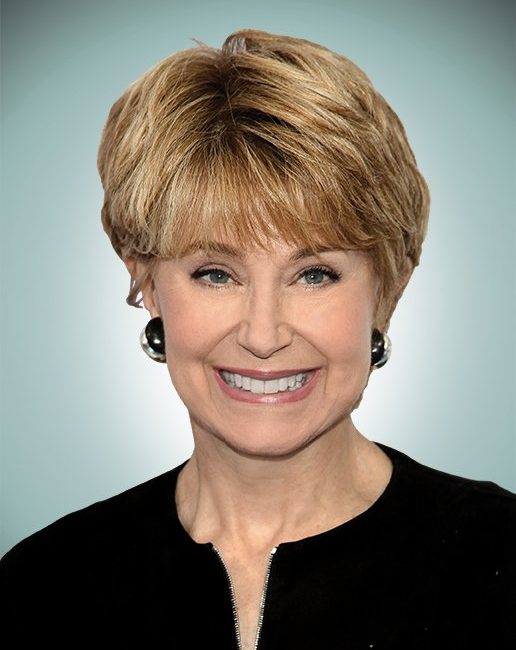
Ask Me Anything: Jane Pauley
Jane Pauley likens her career in broadcast journalism to one of those trick birthday candles that you try to blow out but keeps relighting itself. Last fall, that flame was set ablaze when the 66-year-old Warren Central grad was tapped to succeed Charles Osgood as host of CBS Sunday Morning—becoming only the third person to fill that chair in the news program’s 38-year history.
INTERVIEW BY TONY REHAGEN
The story is that you were sort of handpicked to be on Sunday Morning.
Picked with an asterisk. In January of 2014, I was on a book tour for Your Life Calling—based on a series of AARP-sponsored Today show segments featuring stories about people 50 and over who had reimagined their lives—when Sunday Morning did a profile of me. I had just learned that AARP didn’t want to do a fifth season of segments, which was interesting because there I was, heading out into the country to celebrate people reimagining their futures, and I didn’t know what I was going to do the following month. My agent was friendly with the president of CBS News, who casually mentioned that they had gotten a very positive response on the Sunday Morning segment, and he set up a lunch for me and the executive producer, who offered me four segments in the coming year. I was warmly embraced at CBS from the beginning—it just felt like a home.
Were you a little surprised?
It wasn’t on my radar at all. And yet, last spring, after being a contributor—not even a correspondent, which is more of a full-time employee—for two years, there starts to be a buzz that Charlie was beginning to think about stepping aside and that I might be a candidate. Then a week before his last show, there was an Emmy Awards banquet, and I was seated with my husband, Garry [Trudeau, creator of the Doonesbury comic strip], in a nest of CBS eminences, who were all giving me these knowing grins, maybe a little wink or something. Charlie had a farewell at the end where he introduced his successor, and there I was.
Were you sure you wanted the job?
It was a bigger commitment, and I have two 11-month-old grandsons born seven days apart—so I was already leading a full life. But I had filled in for Charles maybe half a dozen times, and I felt completely comfortable. Dave Letterman did an interview after he left Late Night and said that he might aspire to get something like [my job], and he referred to me and Sunday Morning as a perfect fit. And it did kind of feel that way. It’s a culmination of all the skills and journalism that I had done over a lifetime. And both of my grandsons have looked at the TV and recognized me—never did I think that I would have grandchildren watching me on television.
You do fit in with the show’s folksy and straightforward style.
[Laughs.] Yeah! I wouldn’t say folksy. I would say authentic. There’s an authenticity to the program. When I would watch Charles Osgood hosting in the studio, he didn’t come off as an anchor. He was just talking. What he seemed to do effortlessly was like Frank Sinatra singing a song. There’s a real genius there, but at the heart of it, as with Charles Kuralt before him, was communicating a real authenticity. And I have always identified my most Hoosier characteristic as being authentic. Just being myself. When I started in television, if someone had said “just be yourself,” at the age of 25, I would’ve said, “Well, who is that?” When you’re young, you don’t know who you are. But I do now.
Post-election, many people are bemoaning the fact that mainstream media don’t seem to understand the middle of the country. Do you agree?
I think that’s a bigger problem than just the media. The Midwest is not monolithic. I was just home yesterday—I come home to Indianapolis a lot—and there’s a lot of diversity in my hometown that I wasn’t aware of when I lived there. Nobody feels well-understood, I assure you. But the loud noise that the Midwest made when it exerted its electoral power surprised everyone. I think the Midwest has been disinclined to use its voice in the past. We are not inclined to clench our fists and shout. And I think the Midwest is as surprised as anybody. It’s the biggest political story of my time, without a doubt.
Do you think Sunday Morning, with its longer, more in-depth segments, is positioned to help tell that story?
When the show began, news was either finance, entertainment, or politics. The birth of Sunday Morning was On the Road with Charles Kuralt, a man who deliberately took the backroads finding American stories. That’s our DNA. Finding the backdoor of a story. A different perspective. We’ve been there all along. Nobody does it better. And anybody just discovering us will feel right at home.





